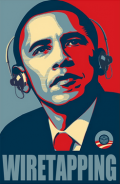WASHINGTON POST: The National Security Agency has broken privacy rules or overstepped its legal authority thousands of times each year since Congress granted the agency broad new powers in 2008, according to an internal audit and other top-secret documents. Most of the infractions involve unauthorized surveillance of Americans or foreign intelligence targets in the United States, both of which are restricted by statute and executive order. They range from significant violations of law to typographical errors that resulted in unintended interception of U.S. e-mails and telephone calls.
The documents, provided earlier this summer to The Washington Post by former NSA contractor Edward Snowden, include a level of detail and analysis that is not routinely shared with Congress or the special court that oversees  surveillance. In one of the documents, agency personnel are instructed to remove details and substitute more generic language in reports to the Justice Department and the Office of the Director of National Intelligence. In one instance, the NSA decided that it need not report the unintended surveillance of Americans. A notable example in 2008 was the interception of a “large number” of calls placed from Washington when a programming error confused the U.S. area code 202 for 20, the international dialing code for Egypt, according to a “quality assurance” review that was not distributed to the NSA’s oversight staff.
surveillance. In one of the documents, agency personnel are instructed to remove details and substitute more generic language in reports to the Justice Department and the Office of the Director of National Intelligence. In one instance, the NSA decided that it need not report the unintended surveillance of Americans. A notable example in 2008 was the interception of a “large number” of calls placed from Washington when a programming error confused the U.S. area code 202 for 20, the international dialing code for Egypt, according to a “quality assurance” review that was not distributed to the NSA’s oversight staff.
In another case, the Foreign Intelligence Surveillance Court, which has authority over some NSA operations, did not learn about a new collection method until it had been in operation for many months. The court ruled it unconstitutional. The Obama administration has provided almost no public information about the NSA’s compliance record. In June, after promising to explain the NSA’s record in “as transparent a way as we possibly can,” Deputy Attorney General James Cole described extensive safeguards and oversight that keep the agency in check. “Every now and then, there may be a mistake,” Cole said in congressional testimony.
The NSA audit obtained by The Post, dated May 2012, counted 2,776 incidents in the preceding 12 months of unauthorized collection, storage, access to or distribution of legally protected communications. Most were unintended. Many involved failures of due diligence or violations of standard operating procedure. The most serious incidents included a violation of a court order and unauthorized use of data about more than 3,000 Americans and green-card holders. MORE
RELATED: Actual NSA Privacy Violation Annual Report
WASHINGTON POST: The leader of the secret court that is supposed to provide critical oversight of the government’s vast spying programs said that its ability do so is limited and that it must trust the government to report when it improperly spies on Americans. The chief judge of the Foreign Intelligence Surveillance Court said the court lacks the tools to independently verify how often the government’s surveillance breaks the court’s rules that aim to protect Americans’ privacy. Without taking drastic steps, it also cannot check the veracity of the government’s assertions that the violations its staff members report are unintentional mistakes. The National Security Agency offered these comments on The Post’s story on privacy violations. “The FISC is forced to rely upon the accuracy of the information that is provided to the Court,” its chief, U.S. District Judge Reggie B. Walton, said in a written statement to The Washington Post. “The FISC does not have the capacity to investigate issues of noncompliance, and in that respect the FISC is in the same position as any other court when it comes to enforcing [government] compliance with its orders.” MORE
RELATED: At a news conference Friday, President Obama insisted that the threat of NSA abuses was mostly theoretical:
If you look at the reports, even the disclosures that Mr. Snowden’s put forward, all the stories that have been written, what you’re not reading about is the government actually abusing these programs and, you know,
listening in on people’s phone calls or inappropriately reading people’s e-mails.
What you’re hearing about is the prospect that these could be abused. Now part of the reason they’re not abused is because they’re — these checks are in place, and those abuses would be against the law and would be against the orders of the FISC [Foreign Intelligence Surveillance Court].
Today our colleague Barton Gellman released new documents that contradicted Obama’s claims. [Turns out] the NSA has, in fact, been “listening in on people’s phone calls.” MORE
PREVIOUSLY: When Obama Told Jay Leno The NSA Isn’t Spying On Americans, He Was Lying Through His Teeth
WASHINGTON POST: James R. Clapper Jr., the director of national intelligence, has acknowledged that the court found the NSA in breach of the Fourth Amendment, which prohibits unreasonable searches and seizures, but the Obama administration has fought a Freedom of Information lawsuit that seeks the opinion. MORE


